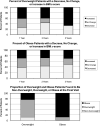Do self- or parent-reported dietary, physical activity, and sedentary behaviors predict worsening obesity in children?
- PMID: 20542293
- PMCID: PMC2936814
- DOI: 10.1016/j.jpeds.2010.04.062
Do self- or parent-reported dietary, physical activity, and sedentary behaviors predict worsening obesity in children?
Abstract
Objective: To determine whether information gathered during routine healthcare visits regarding obesity related risk factors and risk behaviors predicts increases in BMI z-score over time among overweight and obese children.
Study design: Medical records from 168 overweight and 441 obese patients seen for repeated visits between September 2003 and April 2006 were examined for reported dietary, physical activity, and sedentary behaviors, family history of obesity and diabetes mellitus, documented Acanthosis nigricans, and BMI values. Random-effects regression analysis was done to determine whether demographic, familial, or behavioral data predicted changes in BMI z-score over time.
Results: The presence of A nigricans and a family history of obesity were associated with an increase in BMI z-score (beta=0.56, SE=0.09, P<.001 and beta=0.31, SE=0.13, P=.021). These risk factors explained 8% and 7% of the variation in BMI z-score respectively. Self- or parent-reported dietary and physical activity behaviors did not predict change in BMI z-score.
Conclusions: Our findings suggest that the risk factors and self- or parent-reported risk behaviors routinely assessed by pediatric clinicians have limited ability to predict future growth trends, demonstrating the difficulty in determining which patients have the greatest risk of progression of obesity.
Copyright (c) 2010 Mosby, Inc. All rights reserved.
Figures

References
-
- Barlow SE, Dietz WH, Klish WJ. Trowbridge FL. Medical evaluation of overweight children and adolescents: reports from pediatricians, pediatric nurse practitioners, and registered dietitians. Pediatr. 2002;110:222–228. - PubMed
-
- Barlow SE, Trowbridge FL, Klish WJ, Dietz WH. Treatment of child and adolescent obesity: reports from pediatricians, pediatric nurse practitioners, and registered dietitians.[comment] Pediatr. 2002;110:229–235. - PubMed
-
- Whitaker RC, Wright JA, Pepe MS, Seidel KD, Dietz WH. Predicting obesity in young adulthood from childhood and parental obesity. NEJM. 1997;337:869–873. - PubMed
-
- Savoye M, Shaw M, Dziura J, Tamborlane WV, Rose P, Guandalini C, et al. Effects of a weight management program on body composition and metabolic parameters in overweight children: a randomized controlled trial. JAMA. 2007;297:2697–2704. - PubMed
-
- National Initiative for Children’s Healthcare Quality Expert Committee recommendations on the assessment, prevention and treatment of child and adolescent overweight and obesity - 2007: An implementation guide from the Childhood Obesity Action Network. [Accessed 2007]. http://www.nichq.org/NICHQ/Programs/ConferencesAndTraining/ChildhoodObes....
Publication types
MeSH terms
Grants and funding
LinkOut - more resources
Full Text Sources
Medical
Miscellaneous

